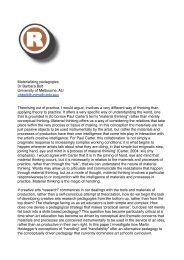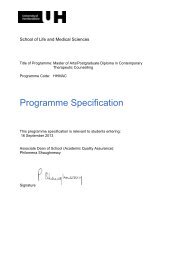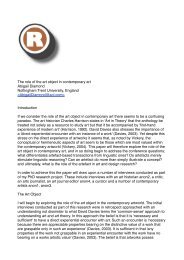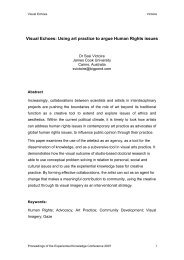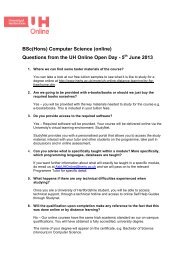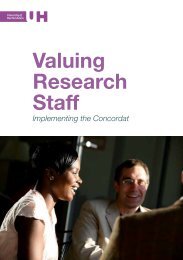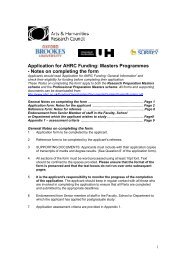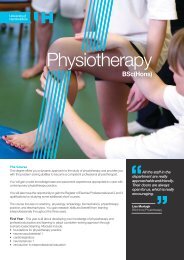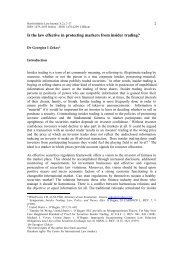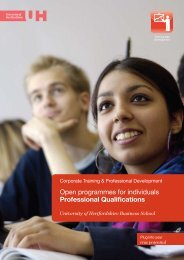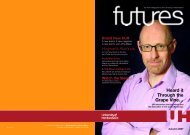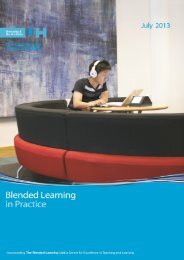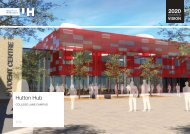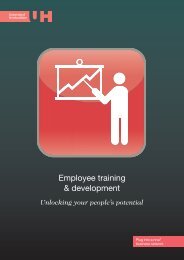June 2009 - University of Hertfordshire
June 2009 - University of Hertfordshire
June 2009 - University of Hertfordshire
Create successful ePaper yourself
Turn your PDF publications into a flip-book with our unique Google optimized e-Paper software.
Introduction <strong>of</strong> a new reflective framework...<br />
11<br />
- The first premise is that reflective practice should follow a structure that incorporates<br />
higher order thinking skills such as analysis, synthesis and evaluation.<br />
- Secondly, that such skills should progress the learning experience from thought to<br />
action and future solutions, thereby encouraging an active process rather than the<br />
passive activity commonly associated with reflective learning concepts.<br />
The application <strong>of</strong> higher order thinking skills, as noted above, are important<br />
considerations for tutors as well as for learners to ensure the competent transfer <strong>of</strong><br />
graduate skills appropriate to healthcare pr<strong>of</strong>essionals who will be expected to<br />
demonstrate such characteristics in their day-to-day practice and continuing pr<strong>of</strong>essional<br />
development.<br />
Our design <strong>of</strong> the RSF is rooted in Dewey's (1933) ideas <strong>of</strong> reflective thinking, which<br />
distinguished a structured approach from that <strong>of</strong> "automatic, unregulated thinking" (pp 4-<br />
9).The framework also promotes the reflective practice ideologies <strong>of</strong> Schön (1983, 1987)<br />
who argued that it is not possible to tell exactly what students learn from reflection in and<br />
on practice thereby providing further justification for our simulation approaches to use a<br />
guided approach through the use <strong>of</strong> a framework. Schön was also a proponent <strong>of</strong><br />
coaching environments for reflective learning such as simulation settings. In the context <strong>of</strong><br />
nursing, Benner (1984) had similarly identified simulation as a useful way for students to<br />
learn and develop. Lastly, from evaluations <strong>of</strong> our learning and teaching experiences <strong>of</strong><br />
simulation developments, we concur with Moon (2000) that reflection does not just<br />
'happen' and students by themselves are not always able to initiate reflective learning<br />
processes effectively, thus further impetus for providing guidance to the students through<br />
the introduction <strong>of</strong> RSF.<br />
Previous reflective practitioner work undertaken in our simulation centre identified that<br />
students at different levels <strong>of</strong> study tended to approach the simulation experience with<br />
varying degrees <strong>of</strong> dependence, interdependence, and independence. A substantial<br />
critical review <strong>of</strong> some <strong>of</strong> the popular existing frameworks in the literature-both cyclical<br />
and linear previously conducted (Jones 2008) aimed to explore their use by paramedic<br />
students‟ over a full curriculum cycle. A quantitative survey <strong>of</strong> final year students‟ views<br />
and observation studies in our simulation learning centre exploring their applications <strong>of</strong><br />
reflective practice in a particular context, concluded that existing frameworks e.g. Gibbs‟<br />
Reflective Cycle (1988) were only partly used thus resulting in limited and ritualised<br />
reflectivity. Further, it is argued here that some <strong>of</strong> the models/frameworks reviewed<br />
(Gibbs 1988; Johns 1993) are based on the assumption that all learners can interrogate<br />
or follow the model equally or that they all have the same learning needs (a one size fits<br />
all approach); hence our rationalisation for an alternative framework that emphasises the<br />
particular learning context and is responsive to the diverse learning needs <strong>of</strong> our students.<br />
One <strong>of</strong> the prime advantages <strong>of</strong> simulation is that learning takes place in a risk free and<br />
controlled environment thus enabling a tailored learning experience to be repeated,<br />
reviewed as many times as the learners need to, and as the learning needs change. It<br />
Blended Learning In Practice <strong>June</strong> <strong>2009</strong>



